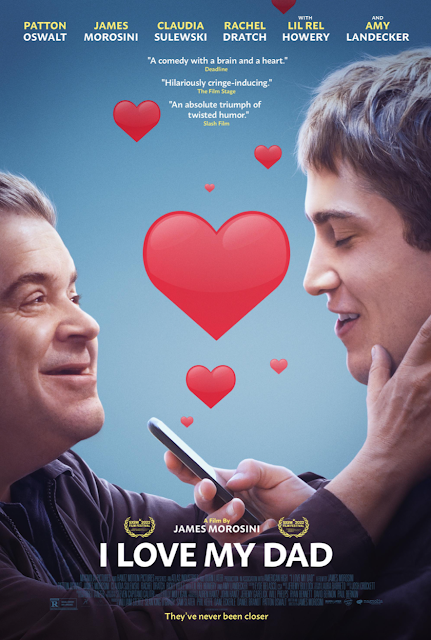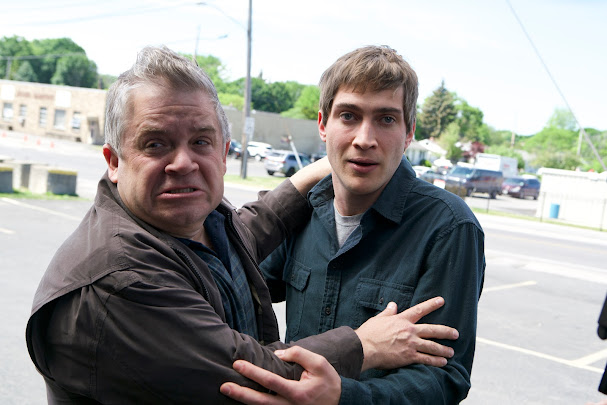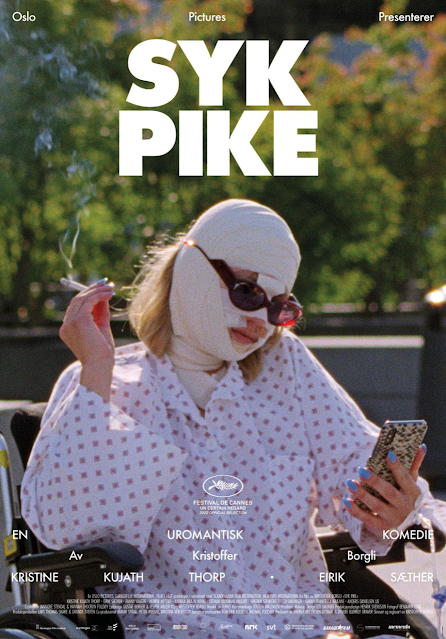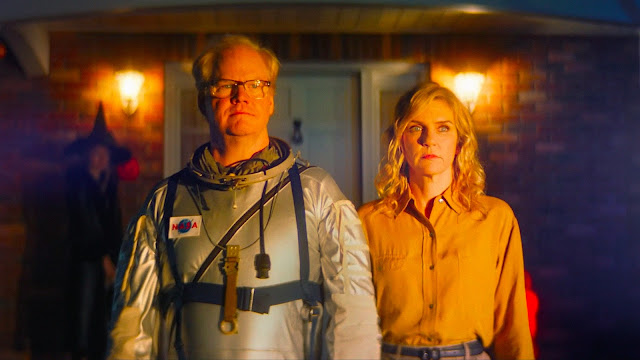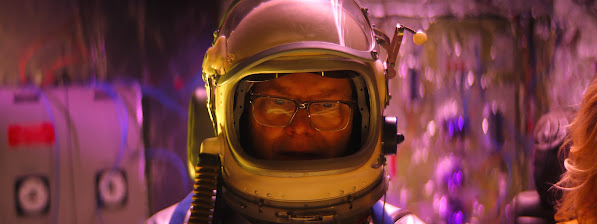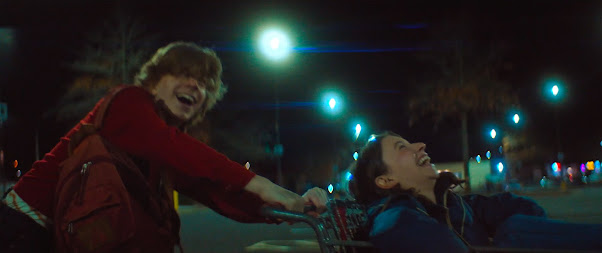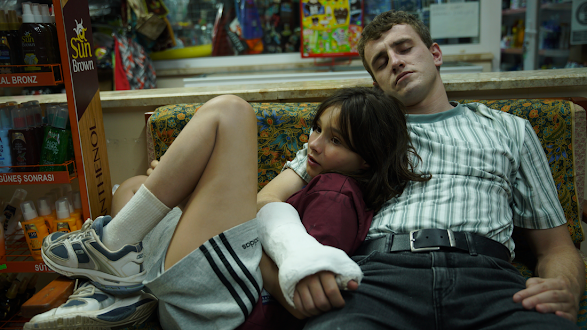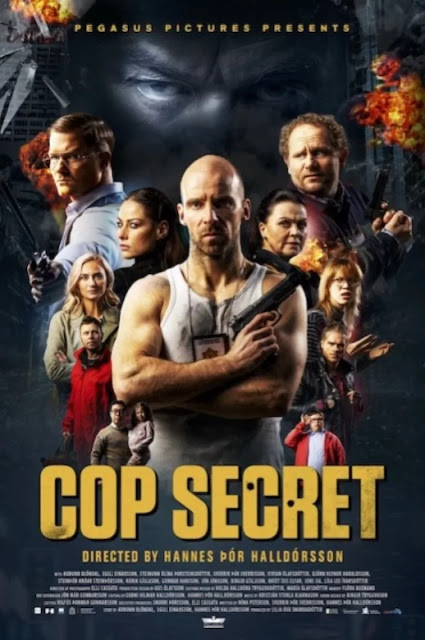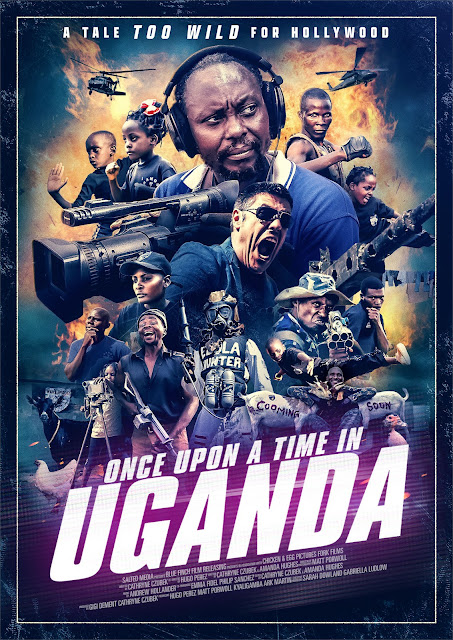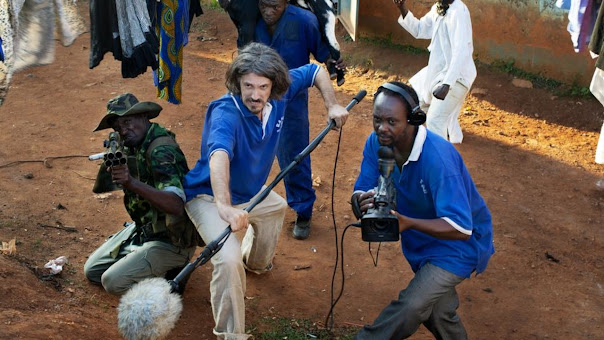Saturday, 22 October 2022
I LOVE MY DAD - London Film Festival 2022
Wednesday, 19 October 2022
SICK OF MYSELF - London Film Festival 2022
Plunged into an existential dilemma after she witnesses a woman mauled by a dog outside the cafe where she works, Signe (Thorp) finds herself indulging in the attention she suddenly receives from her friends, making sure she's okay after such a traumatic experience. But when the spotlight shifts to her artist boyfriend Thomas (Eirik Sæther) - a kleptomaniac whose work consists of furniture stolen from public buildings - Signe finds a way to regain the sympathy of her friends by buying a supply of dangerous pills on the black market that count ghastly skin growths among their side effects. Arriving hot on the heels of The Worst Person in the World and last year's Ninjababy (which also starred Kristine Kujath Thorp), Sick of Myself is the latest example of Norwegian cinema's exploration of narcissism.
Once Signe ingests the dangerous pills - increasing the dose when it doesn't have the immediately gratifying effect she desires - and finds herself hospitalised, the film's darkly comic tone goes into overdrive, with Signe, bandaged head to toe, in orgasmic pleasure at the thought of queues lining up at her funeral to mourn her. A symptom of her narcissism, she has flights of fancy - some comedic, some horrific - that either way see the focus put on her and taken away from her equally self-indulgent boyfriend, just as his career as an artist/provocateur is on the rise. It's when the bandages come off that Signe's plan really comes together. Lying about the pills and claiming her appearance is the result of an undiagnosable illness, the patterns the lesions form on her face are oddly beautiful, turning her into something of an unconventional beauty icon, with photo shoots and modelling contracts on the horizon. Everything Signe could have wished for, but not without consequences.
Written and directed by Kristoffer Borgli, Sick of Myself is an entertainingly cynical comedy that dissects the idea of celebrity and performative sympathy in the modern social media age. Is Signe a bad person for wanting to indulge in her fifteen minutes of fame, and exploit the attention she's given due to her physical appearance? In short, yes. But, Sick of Myself goes some way to show she's not the only one, with the industry behind this exploitation using her "unconventional" look to sell a fashion line also coming under fire. It's bitingly funny, equally cruel, pushing us as an audience to ask if Signe is someone who should be sympathised with or laughed at for the lengths she feels she has to go to to be relevant. As a pretty young blonde woman, superficially she could have it all and has traditional society on her side. Her only failing is her personality - flaws, warts and all. But she can't bear to be average and is prepared to sacrifice her health to give her an edge.
As the shallow Signe, Kristine Kujath Thorp's performance is strong enough to let the audience switch between empathy and disgust as the inevitable monkey's paw aspects of the plot kicks in. Also great in 2021's Ninjababy as a reluctantly pregnant young woman (if you haven't seen that film, you'll want to after seeing her performance here), Thorp is an absolute star on the rise. Stomach churning make up effects or not, you can't take your eyes off her for a second.
After The Worst Person in the World and Ninjababy looked at modern women's relationships to love, men, and having children, Sick of Myself is a refreshingly acerbic against their more sombre tones, but is equally successful at probing these topics on a more fantastical stage than its Norwegian cinema counterparts. At once a critique of the fashion & beauty industry and celebrity status hunters, and a nauseating real world body horror, Sick of Myself is the most grotesque black comedy since Death Becomes Her, delivering a timely warning to the influencer generation of the perils of grasping for fame.
Verdict
4/5
Sick of Myself was part of this year's London Film Festival. It will be released in the UK early next year.
Tuesday, 18 October 2022
LINOLEUM - London Film Festival 2022
When Cameron, the host of a TV science show and wannabe astronaut meets his more successful doppelgänger, he's sent into an existential crisis that will affect his whole family. With his career and personal life in a mess, his only response is to build a rocket of his own and fulfilling his dream of journeying into space. A suburban sci-fi fantasy, Colin West's Linoleum was part of the cult strand at this year's London Film Festival.
Comedian and actor Jim Gaffigan stars as Cameron, the host of Above and Beyond, a Bill Nye the Science Guy-style local TV show that asks questions about the universe, relegated to a late night slot where none of his core audience can see it. His wife Erin (Rhea Seahorn) is unhappy in the marriage and wants a divorce, his teenage daughter (Katelyn Nacon) barely talks to him, and worst of all, a car has seemingly fallen from the sky carrying Cameron's more debonair, successful, astronaut lookalike. All of this serves to send him into an existential crisis that he might not recover from.
It's not unheard of that twisty-turny, timey-wimey sci-fi films end up sharing basic story elements. The biggest problem that Linoleum has is that, despite its attempts to offer something new, it all feels familiar. Sometimes uncomfortably so. The suburban dad mid-life crisis has been seen in everything from Kevin Spacey in American Beauty to Chevy Chase as Clark Griswold in the Vacation films, grimacing through the pain in order to maintain the air of normality in their life. That's forgivable to a point. What is less easy to forgive and, frankly, impossible to ignore is Linoleum's biggest problem... the Donnie Darko problem.
Wilfully poaching characters, story beats and entire scenes from Richard Kelly's 2001sci-fi classic, one of Linoleum's early scenes sees Darko's slo-mo arrival at school sequence (indelibly set to Tears for Fears' Head Over Heels) cloned almost shot for shot, with askew camera angles and staccato frame speeds. The film also features a Grandma Death-esque figure, mysteriously standing off in the distance observing the main characters without any real interaction. On the more egregiously blatant side of thievery (we're way beyond homage here), the main characters even have an unidentifiable jet engine land on their house. It's unthinkable that writer/director Colin West thought the comparisons could exist without comment.
The saving grace of this Darko mirroring is The Walking Dead's Katelyn Nacon as Gaffigan's daughter Nora, who takes on a sort of gender-swapped Donnie role, crossed with his girlfriend Gretchen. With respect to Gaffigan who gives his dual roles his all, Nacon is absolutely the shining star of this often baffling film, providing a confident, charming, yet still weird character who's easy to root for as she builds an unconventional relationship with new neighbour boy and son of Cameron's rival, Marc (Gabriel Rush). In what could have easily been a stock Manic Pixie character, she gives the film real heart in among the doppelgänger/time paradox shenanigans.
With a concept stretched to its absolute limit (it's no surprise to learn West expanded this from an earlier short film), despite first appearances as a semi-generic sci-fi brain muddler with obvious filmic influences, come the finale and a big reveal, Linoleum manages to impressively knit itself together to deliver something truly surprising and actually moving. It's just a shame that for the bulk of the film, Linoleum feels disappointingly derivative, like West fell asleep in front of an old cathode ray TV showing Donnie Darko, American Beauty and Bill Nye, and this is the script they wrote when they woke up.Verdict
2.5/5
Linoleum was part of this year's London Film Festival. It does not currently have a UK release date.
Friday, 14 October 2022
AFTERSUN - London Film Festival 2022
Starring Paul Mescal and newcomer Frankie Corio as a father and daughter on holiday in Turkey, Aftersun is director Charlotte Wells's nostalgic ode to the special bond that exists between parent and child, and how memories of our past stay with us. Taking place sometime in the late '90s (the soundtrack - Bran Van 3000's Drinking in L.A., Los Del Rio's Macarena - and fashions quickly establishing that to anyone who remembers the era) over the course of a summer holiday at a resort in Turkey, Aftersun arrives at this year's LFF with huge festival hype after its debut at Cannes earlier this year.
Unlike his Normal People co-star Daisy Edgar-Jones who was quickly snapped up to star in everything from cannibal comedy horror Fresh to winsome literary adaptation Where the Crawdads Sing, aside from his appearance in the ensemble of last year's The Lost Daughter audiences have so far been kept waiting for the big screen bow of Mescal. Here, as 30 year old Calum, young father to 11 year old girl Sophie, he takes on a similarly brooding, almost tragically emotionally distant character. There's clearly some shared DNA between this and Connell in Normal People, but as much as that role showed us how nuanced and capable he was as a performer, Aftersun expands on that further, making Calum one of the most relatable and troubled father figures in recent memory.
The strength of the film undoubtedly lies in the bond between Calum and Sophie, so close in age that they're mistaken for sister and older brother by other holidaymakers. Amicably separated from Sophie's mother who has moved on to have a family with someone else, this holiday is Calum's opportunity to spend quality time with his daughter over the summer break before she returns to the normality of her life in Scotland, as well as find the serenity he desperately needs in his life. Despite the pent up issues he struggles to hide - presented through undisclosed injuries and disappearances that he can't explain to his daughter - Calum is immensely proud to have Sophie and wants to steer her in the right way in life, having honest discussions with her about drugs and the experiences she may have ahead of her as she grows up, but also giving plenty of room for her to be a kid (playing with the older teens, having a holiday romance with a boy from the arcades - solely based around their shared appreciation for a motorbike racing game), alongside the bonding sightseeing experiences they have together. Even then, when departing a tour bus, rather than following the crowd of tourists they break away from the pack for a momentary dance/tai chi break to cleanse their minds.
But it's with Sophie, the central character of the film played by Frankie Corio, that the film shows its true heart. With flashes of a modern day Sophie (the film is framed by the replaying of an old camcorded holiday video) suggesting how the memories of this formative experience has shaped her life, the younger iteration is a delight to be around. Curious and confident, she's full of childlike wonder at the world ahead of her, glimpsed through the lives of the teens at the resort and the father she adores. She's grown-up in the way 11 year old girls are in comparison to boys, but not opposed to doing kid stuff like getting a braid in her hair (a holiday institution, of course) or performing karaoke in front of the rest of the resort. Corio is excellent as the charming, adorably precocious Sophie, watching and reaching out to her father as the age difference between them seems to shrink as the story progresses and she understands more about life. And Mescal emerges as one of the most exciting actors of his generation, using his now trademark restraint to speak volumes.
Filled with so many flashes of sun-drenched joy and bittersweet moments, anchored by a beautifully melodic score from cellist/composer Oliver Coates, this is a fantastic debut for writer/director Charlotte Wells, that clearly draws from her own memories of the era. Aftersun is a deeply moving experience that will have you nostalgic for an easier, simpler time, asking you to pause and think back on your own experiences and how they've shaped your life.
This is something special.
Verdict
5/5
Aftersun was part of this year's London Film Festival. It will be released in cinemas by Mubi on November 18th.
Friday, 15 July 2022
A BUNCH OF AMATEURS - Sheffield DocFest 2022
With the future of the group growing ever uncertain, the Bradford Movie Makers look for ways to raise funds to keep their dilapidated clubhouse going. But with flytippers, vulgar graffiti, arson, an increasingly ageing roster of members and a global pandemic in the way, it will take all of their organisational skills to attract an audience for their makeshift masterpieces.
Meeting every Monday since 1932, clubs like the Bradford Movie Makers might be a rarity these days, but were once seen across the country. Now one of the longest surviving groups of its kind, they've weathered the storms of a dwindling membership and the general apathy of the community around them to continue creating their low (more accurately no) budget films such as gothic horror Appointment in Walthamstow and Harry's passion project of a Bradford set re-staging of Oklahoma, complete with him singing from atop a horse. As to why it's still called Oklahoma, you'd have to take that up with Harry and his artistic vision.
Shot over the course of a few years, Kim Hopkins's documentary digs into the lives of some of the key members of this eclectic group of grumpy old men, like the unbridled visionary Harry (the key quote as he puts together the credits for his film - "I want it to keep saying my name", the glib response being "I wonder why"), former club president Colin, and troubled directorial genius Phil. Despite their stoicism and occasional inability to express themselves, Hopkins is able to capture some truly moving moments within the group, like the quietly dignified Colin making the trip to the clubhouse following some tragic personal news, just to be around those who know him best. On the opposite end of the scale is the perpetually optimistic Marie, who's bravely stepped into this boy's club to get the community involved and save the club from bankruptcy.
At its heart, A Bunch of Amateurs captures that renegade charm associated with filmmaking, with director Phil Wainman a more competent version of American Movie's Mark Borchardt, despite his often heated disagreements with other members of the creative team. The films, whether spoofs, remakes or based on original material, bring to mind the films within a film from Michel Gondry's Be Kind Rewind and Garth Jennings's Son of Rambow, but with a decidedly more English, more Bradford sensibility to them. And that's not to say they're bad either. Phil proudly displays the awards he's won for his trippy, avant garde short films, and some of the filmmaking techniques put to use - such as digitally disguising a young female horse rider as the vastly differently proportioned Harry - are impressive feats of amateur filmmaking.
A mixture of community spirit, individual character study and with an overall love of films and filmmaking, A Bunch of Amateurs effortlessly captures the lives of these tortured artists and miniature Cecil B. DeMilles, all with the goal of making their scaled down version of Hollywood with their friends. I wouldn't be surprised to see a fiction film adaptation within the next couple of years (Honestly, I can already picture Patrick Stewart, Brian Blessed and Jane Horrocks lining up for this), but of course, documentary is always the best way to tell a true story, and Hopkins delivers a charming and uplifting one here. Even when Covid hits and the group is forced to find new ways to hold their meetings, it proves that even against the odds, the show must go on.
Verdict
4/5
A Bunch of Amateurs screened as part of the 2022 Sheffield International Documentary Festival (DocFest). More information about the festival and its line-up can be found here.
MCENROE - Sheffield DocFest 2022
Taking in the highs and lows of his sporting career, this revealing documentary follows tennis superstar John McEnroe's meteoric rise as tennis's new "super-brat" superstar in the early 1980s, his long standing rivalry with Bjórn Borg and his habit of self sabotaging his career under the immense weight of the new-found celebrity status he was ill prepared for.
To tell the story of the bad boy of tennis and the long journey to where he is now as a respected pundit and commentator of the sport, director Barney Douglas employs a storytelling device with mixed results, having McEnroe travel from his childhood home of Douglaston, NY to the nearly empty streets of New York City, wordlessly encountering key figures from his past along the way. But having McEnroe come across Bille Jean King in a train station waiting room and not interacting with her, or hearing the words of his father spoken through the receiver of a payphone to which he cannot reply, suggests the film's central subject wants to keep his past at a distance. An outstretched arms length whilst an ace roars past him. This doesn't seem ring true in McEnroe's on camera interviews that feature prominently in the film, as he's remarkably open and self-reflective for someone with such an infamously tempestuous past.
Sure, Douglas's film - with input from McEnroe and family - is far from a celebration of his bad boy antics, focussing more on his sporting achievements (which in discussions of McEnroe are often forgotten about in favour of his celebrity status), but the film finds its weightiest moments when it looks at McEnroe's familial relationships - in particular the one he had with his father and manager, John Snr. A business relationship that took precedence over their personal one, the interviews McEnroe gives reveal a lot of restrained anger and resentment that's not entirely been unpacked yet.
Likewise his rivalry with Bjórn Borg. Now both elder statesmen of tennis, the doc makes great use of their memories of that time through the extensive archive material available, with thrilling footage from their many face-offs taking up a fair amount of screen time; although the inability to get them both in a room together - Borg, happily retired and at a lakeside retreat in Sweden, was restricted from travelling due to Covid - leaves the film missing a crucial component in telling the full story of their sporting battles.
Among the less successful aspects of the film, Douglas employs a flashy Tron/Escape from New York-style line grid motif, peppered throughout in the hope of placing McEnroe's histrionics in a modern context of his mind simply wanting put things in order. A flashy light display that's hard to see the relevance of, it's overkill for a film that already employs one device to varied success. Although not formally diagnosed with mild autism or Aspergers, Douglas's film makes clear that some tell-tell signs are there, and as John's wife Patty describes, are the path to understanding the real man. There's interviews with some of his children, looking back at the mania that came with their famous father and how it effected their lives. Notably not as guarded as their father, the late addition of these interviews are among the highlights of the film.
Biographical documentaries made with the active involvement of the key figure (and family) always run the risk of being self-aggrandising exercises in pompous self promotion. That's not to sat McEnroe's story isn't an interesting one to tell, but this doc (exec produced by McEnroe) suffers a little from hero-worshipping its subject. Perhaps that's to be expected from a documentary titled McEnroe, and it does hold his behaviour to account to some degree whilst respectfully not digging into some painful moments in his personal life, but there's the unavoidable feeling that there's more of McEnroe's story to tell. But for fans of McEnroe or for those wanting to find out some more about him, this documentary serves well as a potted history of the man, and the myth that comes with him.
Verdict
3/5
McEnroe screened as part of this year's Sheffield DocFest, and is now on general release.
Wednesday, 6 April 2022
THE HERMIT OF TREIG review
After living a lone, solitary life for 40 years, you'd expect Ken Smith to be a grumpy old loner. On the contrary, his is a life built on his own desire to live life on his own terms, but he's welcoming to those who pass by his little cabin on the hills surrounding Loch Treig. Among those visitors is debut director Lizzie MacKenzie, who after knowing Ken for 7 years, persuaded him to allow her to document his unique day to day life.
With a shared passion for photography that's helped forge their bond (Ken has spent decades capturing the beauty of the Loch and the flora and fauna of the surrounding woodlands), Lizzie - whose voice is ever present off camera, talking to Ken - tries to find out why Ken chose this lifestyle, and what he will do when it becomes too unsafe for a man of his advancing years to live so far away from the rest of the world.
Suffering a traumatic attack when he was 26 that lead to a brain haemorrhage and told he'd never walk or talk again, Ken defied the odds by recovering, then decided not to live on anyone else's terms again. After travelling the world he settled at Loch Treig because of its unique beauty and isolated nature. "It's known as the lonely Loch. There's no roads here". Building his own log cabin filled with diaries, notebooks, photographs and slides, living his life the way he wants has been his life's work - but with his once dark hair and beard as white as the snow on the ground around his cabin, the question of what his remaining days will be like lingers, despite Ken's assertion that he plans to live to 102. He knows he didn't choose an easy life, having to walk 27 miles to nearby Fort William and back again when he needs to do something as everyday as posting a letter, but he clearly feels at home on the banks of the Loch, stating "I think if you love the land, it sort of loves you back. It loves you in all the things it produces for you".
The Hermit of Treig is a wonderfully moving, deeply personal documentary about life, ageing, and most importantly, those connections with others that add joy to our lives. His only regular contact with the outside world is a beacon he has to use once a week so the local authorities know he's okay, but Ken clearly loves having Lizzie around, eagerly showing photos of the first log cabin he built before it burnt down - even going so far as to mock up a charming miniature replica from sticks - and playing up to the camera with his many weather-worn hats, and she similarly enjoys his company too, her camera quietly picking up on his failing memory when he misses diary entries or forgets conversations about his blooming roses. It's a gentle, thoughtful commentary that's respectful of Ken and his tenacity.
A fascinating character study with a real emotional punch over the sacrifices his way of life have cost him (Ken reads a letter he sent to his parents when on his travels, hoping they'd meet him at Heathrow airport but unaware they'd passed away in his absence), it in turn shows the strength Ken draws from the landscape around him. As he puts it, "it's a nice life, ain't it? Everybody wishes they could do it, but nobody ever does." The strikes of his axe might be coming down softer than in previous years, but in spite of his wavering vision and balance and a health scare that leads to a brief hospitalisation, he's not ready to give up his singular world just yet, and who could blame him.
Verdict
4/5
Thursday, 24 March 2022
COP SECRET - BFI Flare Film Festival review
Going to extreme measures to protect the mean streets of Reykjavik, no nonsense cop Bússi (Auðunn Blöndal) is known as the toughest cop around. But when a merging of departments sees him given a new partner in the form of Bess (Egill Einarsson), a sharp suited detective also known for getting results, the two must work together to solve a madman's plot to blow up the city's stadium whilst Bússi also confronts the new feelings he has when he's around Bess.
Kicking off with an all-action car chase across Reykjavik, we're introduced to the Jason Statham-alike Bússi, (all shaved head and leather jacket) a gruff, manly cop who's not keen on being paired up with the well groomed Bess, a pansexual detective who's going to challenge Bússi to the title of best cop around. Paired together to solve a plot to blow up Reykjavik's stadium during the Iceland v England Women's World Cup, they find themselves quickly falling for each other.
The mismatched duo forced to work together until they find common ground is a long standing cliche in Hollywood, particularly with cop movies starring big, bald actors about renegade detectives who don't play by the rules. Such is the height of hyper-masculinity in action movies that it's surprising it's taken this long for someone to take the next logical step, converting that homo-eroticism into a full blown romance between its two leading men. With a wry comedic set up backing up the all action premise, surely it's a formula that can't fail? Sadly, Cop Secret, despite its best efforts, is not the success it should have been. There's things to enjoy in its appreciation of action movies, from its ridiculous villain, Rikki Ferrari (inexplicably, but enjoyably, the only character who speaks English language at all times), angry shouty police chiefs, to adhering to the classic buddy comedy formula, albeit with the obvious twist thrown in.
But in sticking so close to a formula the story feels far too generic, taking inspiration from bad cop movies but not turning those ideas into something more exciting. For want of a better term, Cop Secret plays it straight-faced, but when skewering the action genre cliches, the likes of Edgar Wright's Hot Fuzz and Shane Black's Kiss Kiss Bang Bang did it better. Let's be clear that Cop Secret isn't actively trying to compete with the likes of Vin Diesel, Jason Statham and The Rock, with some ropey digital explosions showing the budgetary limitations. But it is offering a commentary on Hollywood's action genre cinema, including its aversion to including anything openly queer within its narrative, and has some success with that. There's nothing scandalous or inappropriate about the central love affair, and it's there the film does break some new ground.
Directed by Hannes Halldórsson, an Icelandic goalkeeper turned filmmaker - and written by Halldórsson and his two leading men - it's a genre experiment that you find yourself willing to be better, so close it is to striking gold by mixing up the action genre formulas. Sadly, the end result doesn't quite work as a spoof, satire or straight-up action flick.
Verdict
2.5/5
Cop Secret screened as part of this year's BFI Flare Film Festival. More information about the festival and the films included can be found here.
Wednesday, 16 March 2022
A-HA: THE MOVIE - Glasgow Film Festival review
Following Norwegian pop-stars A-Ha as they prepare for their latest tour, this new documentary reveals a wealth of information about the band's history, their solo projects, and how they crafted their most widely known contribution to pop, their 1985 classic hit, Take On Me.
Having sold in excess of 50 million albums over the last 40 years, A-Ha are still touring to this day. In preparation for their most recent stretch of shows and a coveted appearance on MTV's Unplugged, the band allowed cameras to follow their rehearsal progress, including personal interviews that reveal what has kept Norway's biggest musical export going for so long.
In a creative decision that was inevitable, the filmmakers employ the pencil sketch animation style of Steve Barron's classic music video for Take On Me, which - although impressively rendered - mercifully only lasts the duration of the introductory flashbacks that reveal the band members' childhoods. Around the first 15 minutes of the film. It's fitting that the iconic visual motif is used to this extent, as the whole film could be about the band's desire to escape from the long shadow their biggest hit has cast over them. They may have been accused of being 'one hit wonders' over the years, but racked up a number of hits (including the Bond theme for The Living Daylights). Even so, they would freely admit that their career has been defined by their signature song.
The pop band biopic has seen some interesting new twists in recent years, perhaps most notably Bros's After The Screaming Stops which leaned heavily on the ridiculous Anvil-like aspects of pop stardom, painting the brothers Goss to be somewhat disconnected from reality. Here directors Thomas Robsahm and Aslaug Holm deliver a much more grounded portrait of their subjects, largely thanks to the influence of Magne and Pål, the two key songwriters of the group. We get to learn about the band's humble origins, from schoolboy musical experimentation between Magne and Pål, to the bizarre coincidence that one of the witnesses to Magne's father's plane crash death was his future bandmate, Morten, years before they met. Propelled by a strange sense of destiny that the trio were going to perform together, they reminisce how as cocksure teenagers they manifested "we're going to be international popstars... Norway's too small for us" before heading off to London in 1981 in search of fame, fortune and that elusive chart-topper.
If you know anything about A-Ha, other than their early success with the MTV hit Take On Me and their Bond theme for The Living Daylights, it's probably focused on frontman Morten Harket, and the legions of adoring fans he has maintained since the 80s. A striking, elfish looking man who has the level of sex appeal you'd hope a lead singer to have, this meant that his two bandmates were pushed out of frame somewhat. Thankfully for the band's harmony, this film makes clear that Magne and Pål neither courted this kind of attention or begrudge Morten for having it. Throughout the film there's a number of comic moments where they see the funny side of being an after thought when greeted by hoteliers and fans across the world who want to fawn all over Morten, who's perfected a polite smile for the camera when he's clearly weary of the attention he receives.
What's surprising about this documentary is that it avoids the temptation to focus its attention on frontman Morten (who, frankly, is the least interesting of the three), giving the same weight to Magne and Pål's lives and projects away from the band. There's equal narration from all three men, and a revealing look at their surprising musical and artistic depths that would be unknown to all but the most hardcore of fans. There's also discontent within the band always threatening to bubble up to the surface, namely the age old issue with songwriting credits and the share of the royalties. It's here the documentary has the most drama, with the highlight being the deep dive into the production of Take On Me in the early-to-mid 80s. Based on a keyboard riff Magne wrote at 14 years old but largely credited to Pål, it went through numerous guises (different versions were released at least twice in various territories) before emerging as the reworked synth-pop classic we all know and love.
Still, despite the usual dramas you'd expect to find in a band who've been together for 40 years, A-Ha: The Movie doesn't offer much in a way of turmoil. There's a hint that producing a new record might bring old resentments to the front, but they're clearly a tight-knit unit that still pack stadiums on tours, and have been an acknowledged influence on bands like Coldplay. A-Ha: The Movie is a fan-pleasing portrait of the band, but for newcomers or casual observers will offer a surprising level of detail about their long career too.
Verdict
3.5/5
A-Ha: The Movie screened as part of this year's Glasgow Film Festival. More information about the festival can be found here.
Saturday, 12 March 2022
ONCE UPON A TIME IN UGANDA - Glasgow Film Festival review
Growing up watching the Sly Stallone and Chuck Norris action films of the 1980s, Isaac Nabwana dreamt of one day making his own films in his home town of Wakaliga, Uganda. Armed with a digital camera and his own ingenuity building sets, props and camera jibs, as well as drafting in locals to stars for his super low budget action extravaganzas, his films soon found a dedicating cult following online. Among those fans was New York based filmmaker Alan Hofmanis who, after seeing Isaac's film, Who Killed Captain Alex? back in 2012, decided to move to Uganda to help build this emerging film industry, better known as Wakaliwood.
Directed by Cathryne Czubek and Hugo Perez, this documentary explores Isaac's filmmaking techniques on little to no budget (estimates for the overall production cost for Who Killed Captain Alex? range from $85 up to $200), and Alan's efforts to launch Isaac to a wider global audience, acting as producer, promoter, boom operator, as well as getting roped into appearing in some films as the only Muzungu (white man) in the area, and therefore the perfect casting for a specific Ugandan movie trope - "beat up the white man". The only problem is finding him a suitable stunt double - something they get around by 'whiting up' a black actor.
In what many would deem to be an act of madness, this doc effectively captures why Hofmanis would be willing to uproot his entire life for this emerging film industry. A struggling filmmaker himself, it's quite touching how sincere his appreciation for Isaac's films is despite their clear budgetary limitations, and his non-wavering belief that he could be the next big thing if audiences are given the opportunity to see such films as Crazy World, Bad Black, and the upcoming Ebola Hunter. There's a great dynamic between the two men, and despite their cultural differences the only real signs of artistic discontent appear when a high profile local media mogul offers Isaac the opportunity to make a Captain Alex TV series for his network, something Alan feels will distract from his efforts to launch Isaac's films internationally, with the prospect that the Toronto International Film Festival will be willing to feature his latest film at one of their legendary and influential Midnight Madness screenings.
Wakaliwood is proper low budget, DIY filmmaking that makes Troma or The Asylum look like a 300 million Michael Bay production, offering something so pure and unjaded about the filmmaking process that Isaac and Alan are easy figures to root for. It's open for debate as to whether Isaac is the next big action movie director or more akin to Tommy Wiseau or Neil Breen, but you can't dispute his commitment to filmmaking and making it an integral part of his community, going so far as to train the local kids in martial arts so they can one day appear in one of his films.Radiating with a love for action movies, Once Upon a Time in Uganda is a fascinating look at what collaboration and the filmmaking process can create, showing how a lack of budget can't get in the way of the joy of bringing people together through cinema.
Verdict
3/5
Once Upon a Time in Uganda screened as part of this year's Glasgow Film Festival. More information about the festival can be found here.

